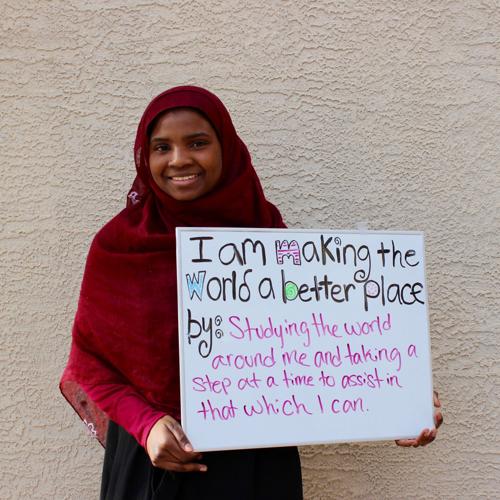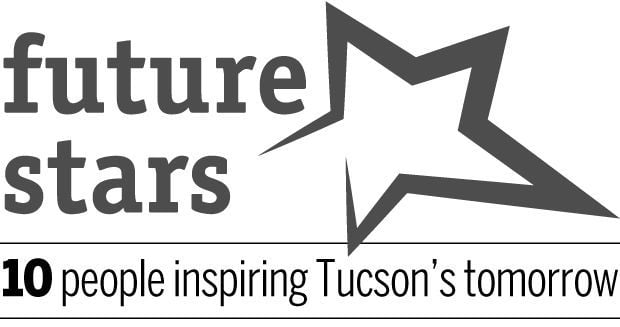For Fatuma Salat, 18, moving from Kenya to the United States about 10 years ago was a game-changer.
In Kenya, many schools need desks, chairs, school supplies and teachers, Salat says. In Tucson, she has access to all of those things — plus a shot at college.
Upon graduating from Desert View High School this year, Salat hopes to attend the University of Arizona in the fall.
“If it wasn’t for moving here, I wouldn’t really have been given the opportunity to make a change. But to move here has given me the opportunity to really make a change not only in this area, but also in other areas of the world,” Salat says. “Here I’m provided with much more than I was provided with in Africa.”
But it has been hard.
The family left Kenya in 2006 to escape violence, war and ongoing threats to the family.
“People would come to your doorstep and say, ‘Let me have your child because I need them to do this and this and this, and if you don’t do this, we’ll hurt you,’” Salat recalls. “That made us want to leave because that had happened to us before.”
The family also frequently ended up without a home, with storms destroying shelters made of sticks and mud. Salat remembers life in homes with no air conditioning, no bathrooms and two-mile treks for water.
Upon moving to the U.S., she entered the first grade, frightened by an English-speaking world that she could not understand.
Over time, that has changed.
“Because I dress differently from others, people were questioning me, asking, ‘Why do you dress this way? I hear this about you. Is this true?’” Salat says. “And I say, ‘No this is not true.’ And I want to fix these issues because I don’t want others to be frightened of me, and I don’t want to be scared of them. I want us to come together despite our differences.”
As an eighth-grader at Chaparral Middle School, Salat decided to address the questions head-on. As a Muslim with dark skin, a head scarf and long skirts, she faced mockery from some classmates.
In response to a presentation Salat did on Kenya and Islam, a classmate threw a verbal barb at her — a remark that sparked a heated exchange between Salat’s friends and other classmates.
“The kids were bullying them bad, and she was the one who decided to do a presentation on the culture, talking from the heart,” says Barb Mathers, a former Chaparral counselor and teacher of a college prep class there. Mathers is now a counselor at Ocotillo Learning Center.
At the time, Salat was in Mathers’ class. Since then the two have maintained contact, in person and through texting.
Mathers remembers Salat explaining to the entire student body what it felt like to be bullied, the kind of life she and her family came from in Kenya and her dreams for college and the future.
“I got on the stage and read my speech even though I was a bashful kid,” Salat says. “As I looked off into the crowd, I saw some teachers and students tearing and knew at that moment my school would be joined together again despite our differences. But I didn’t just want that in the school. I wanted that in the community.”
Suddenly, she wasn’t sitting alone at the lunch table.
“Everybody noticed the change in those kids,” Mathers says.”The whole climate of the school changed that year.”
But that wasn’t the last time Salat dealt with prejudice. She doesn’t let it discourage her. Instead, she wants to repeat that middle school miracle in the greater community.
Her post-high school dreams vary. Perhaps she will study dentistry or biomedical engineering or physical therapy.
Salat is part of Pima County’s Joint Technical Education District (JTED) and taking a course that will have her certified as a physical therapy technician — a job that will also help her family financially.
At school, she is involved in the National Honor Society and the college readiness program Upward Bound. Sometimes she volunteers with Mathers, working with kindergarten and first-grade students, the Ocotillo counselor says.
Salat does most of her homework while still at school, late at night or when she wakes up at 4 a.m. After school, most of her time is devoted to caring for her eight younger siblings. Her fluency in English also plays a significant role in helping her family communicate.
“There are lots of chores I have to do within the house, and I have to babysit when my mom’s gone, and that gets in the way of education since it’s senior year and there is more to do,” she says. “I cook for the kids before they go to school, and when they come back I have to feed them and clean up after them. I help them prepare for bedtime.”
Maybe someday she will return to Kenya and start an organization that builds schools or provides school supplies — to give those kids some of the help that she got.
But for now, one goal is all-consuming.
Graduation is coming.
“That fact that it’s approaching is exhilarating, but there is a lot of work,” She says. “There’s so much you have to do to get there, so it’s a challenge, but I’m looking forward to it. I will make sure I get there.”





